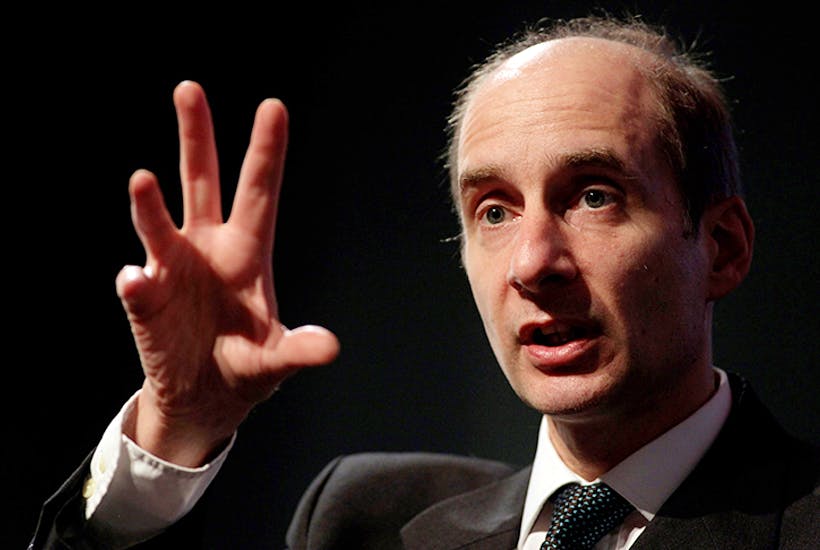The politics professor Matthew Goodwin made an interesting observation on Twitter this week. He pointed out that many of the characteristics of the ‘paranoid style’ in American politics — a phrase coined by Richard Hofstadter to describe right-wing populists such as Barry Goldwater — apply to left-wing anti-Brexit campaigners. They are convinced that the 2016 referendum result was due to the machinations of sinister data-mining companies, Kremlin bot factories and Vladimir Putin.
I reread Hofstadter’s 1964 essay and the parallels are striking. The paranoid style is characterised by ‘-heated exaggeration, suspiciousness and conspiratorial fantasy’, all of which were on view this week, with Gordon Brown accusing the Brexit party of being funded by sinister foreign forces. The ‘evidence’ for this is almost laughably threadbare. Donations of under £500 to the party are supposed to be in sterling, but it’s technically possible for foreign donors to convert their currency into sterling via PayPal (true of every political party, including Change UK). Nevertheless, the Electoral Commission visited Brexit party headquarters to investigate.
Hofstadter contrasts the paranoia of 19th-century populist movements, which saw in Jews, Catholics and Free-masons an external threat that had to be repelled to preserve the American way of life, with the fabulist claims of Joseph McCarthy, who believed malign foreign forces had embedded themselves in powerful institutions and had to be expelled. This more recent manifestation of the paranoid style is fuelled by a sense of ‘dispossession’, of ‘powerlessness’ in a section of American society. ‘America has been largely taken away from them and their kind, though they are determined to try to repossess it and prevent the final destructive act of subversion,’ he writes.
That perfectly captures the style of bug-eyed Remainiacs such as A.C. Grayling, Alastair Campbell and Andrew Adonis, and explains what often looks like unhinged behaviour, such as Adonis’s obsession with the BBC’s ‘pro-Brexit bias’. In the course of seven days he tweeted about this 72 times, and last year wrote to the director–general of the BBC demanding that Andrew Neil be sacked. Only this week, Adonis called for BBC News to be taken over by Channel 4 News, which, in his eyes, is the only broadcast organisation brave enough to tell the truth about Brexit.
You get the impression Adonis believes he’s engaged in a struggle against demonic possession in which only a few enlightened souls can see the danger. ‘The paranoid spokesman sees the fate of conspiracy in apocalyptic terms — he traffics in the birth and death of whole worlds, whole political orders, whole systems of human values,’ writes Hofstadter. ‘He is always manning the barricades of civilisation.’ The same apocalyptic tone is detectable in Bad Boys of Brexit, a website maintained by the Green MEP Molly Scott Cato. Cato believes Brexit was orchestrated by ‘an unholy alliance’ of ‘the very wealthiest members of a global elite’, many with ‘highly questionable Russian connections’ and hellbent on ‘undermining the very foundations of democracy’. As if aware of how this might sound, Cato adds: ‘This site describes not a conspiracy theory but a conspiracy fact.’ Among the ‘conspirators’ identified by Cato are Dominic Cummings, Michael Gove and Matt Ridley.
But the ultimate exemplar of the paranoid style in British politics is journalist Carole Cadwalladr. ‘Very often the enemy is held to possess some especially effective source of power,’ writes Hofstadter. ‘He controls the press; he has unlimited funds; he has a new secret for influencing the mind (brainwashing)…’ Those are the themes of nearly every Cadwalladr article, with ‘-unlimited funds’ coming from Russia and brainwashing supplied by Facebook.
Hofstadter goes on to describe how ‘paranoid literature’ combines ‘fantasied conclusions’ with an ‘almost touching concern with factuality’. That reminded me of Cadwalladr’s attempt to flesh out her theory that Arron Banks and Andy Wigmore had gone skiing in Italy to secretly arrange for Matteo Salvini to veto an extension to Article 50.
There is no doubt: a deranged style of politics that used to be confined to the populist right has infected several prominent Remainers. The wonder is that anyone takes them seriously.







Comments